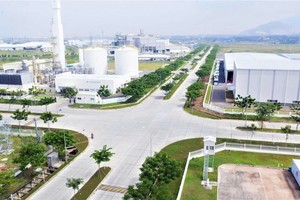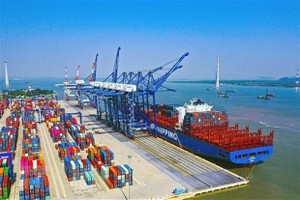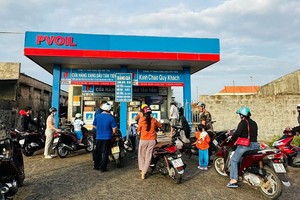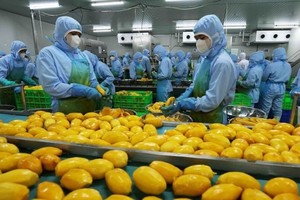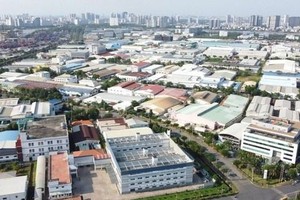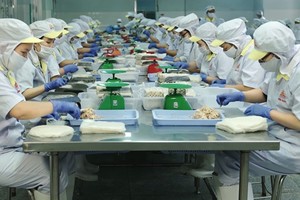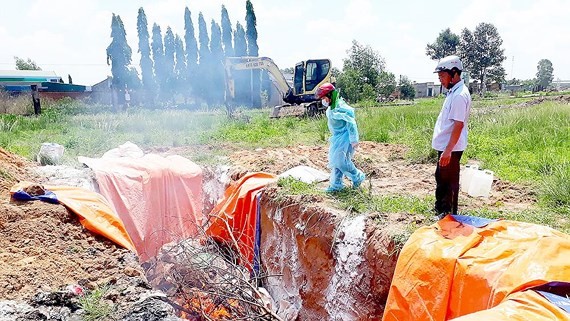
In Binh Phuoc Province, in May this year, African swine fever first appeared in Tan Phu Town of Dong Phu District and spread to ten out of eleven districts, towns and cities by mid-August with 243 households in 47 wards, communes and towns suffering losses estimated at tens of billions Vietnamese dongs. Farmers had invested a large amount of money in their pigs while financial support by the Government was separated to several turns so farmers have been struggling. In Phu Rieng District, 84 pig farming households had had pigs infected by African swine fever and had to destroy 1,135 pigs but up to now only 74 households have received financial support with an amount of VND575 million. Many pig farming households said that the epidemic has sent several farmers into difficult situation that they do not know when they will be able to reproduce.
In Dong Nai Province, which is considered as the capital of pig-farming industry in Vietnam, African swine fever is raging. Mr. Nguyen Van Hoang lives in Vinh An Town, Vinh Cuu District, said that in 2017 his family went to Vinh Tan Commune and rented two farms to raise pigs with a total of 2,000 pigs. The first litter of pigs gave profits but in the next litter, the price of pigs suddenly hit rock bottom, causing his family to be empty-handed and in huge debt. His family continued to borrow money from banks to invest in new litter of pigs but when their pigs were ready for slaughter, all 2,000 pigs were infected with African swine fever.
“Since I started raising pigs, only the first litter was effective. After that, there were constant losses that I could not make any effort anymore. My family has put our house in downtown up for sale to settle our debts," Mr. Hoang sadly said.
According to statistics by the Department of Agriculture and Rural Development of Dong Nai Province, African swine fever occurred at 3,000 households in 122 communes; 301,000 pigs were destroyed, mainly at Trang Bom, Long Thanh, Vinh Cuu and Thong Nhat districts, causing an estimated loss of about VND405 billion. Of which, Vinh Cuu District had the highest number of pigs being destroyed with more than 59,000 pigs, worth around VND100 billion. The loss is huge but the province has just supported nearly VND43 billion for pig-farming households.
African swine fever appeared in Ba Ria - Vung Tau Province at the end of June this year and has spread to 46 communes in the province. The epidemic did not happen only at small-scale wild-boar-farming households but also at large-scale farms. Mr. Vu Van Tien, a farmer in Hoa Hoi Commune in Xuyen Moc District, said that at the time when the weights of his pigs reach 20-30 kilogram each, they were found to be infected with African swine fever so he had to destroy all his pigs. This epidemic has caused his family not only unable to pay his old debts but also owe nearly VND50 million more.
Not only having had to cope with African swine fever, Ba Ria – Vung Tau Province recently detected two outbreaks of highly pathogenic H5N6 bird flu and forced to destroy 10,500 chickens at two farms in Xuyen Moc District.
While people were struggling because of epidemics, in mid-August, due to heavy downpour, floods caused low-lying areas in Tan Phu and Dinh Quan districts in Dong Nai Province to be inundated, sweeping away farm produce and properties of people. Preliminary statistics of the Department of Agriculture and Rural Development of Dinh Quan District showed that floods made 5,000 tons of fish dead or escaped from floating fish farms; 250 hectares of crops were submerged, causing a loss of above VND220 billion. Many cage fish farming households have been facing debts of billions Vietnamese dong as their fish were killed by floods. According to the Department of Agriculture and Rural Development of Dong Nai Province, since the beginning of this year, there were around 1,000 tons of fish dead because of natural disasters in the province.
This is the best time for reproduction to serve the Tet market. Despite being supported by the Government, many farmers in Southeast provinces still do not have enough capital to reproduce. It is unavoidable that many pig-farming and poultry-farming households will declare bankruptcy and their farms will be deserted.



